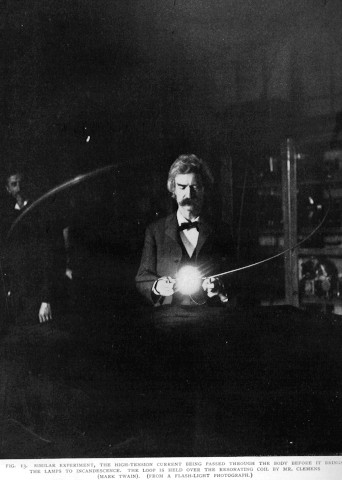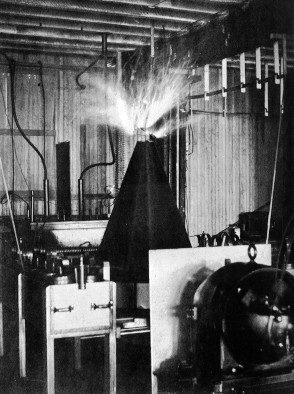Nikola Tesla
Today, let's get to know the man who gave us alternating current. The University of Houston's College of Engineering presents this series about the machines that make our civilization run, and the people whose ingenuity created them.
When I worked in Yugoslavia, some years back, I especially liked their 500-dinar notes. They were a kind of 30-dollar bill, with a picture of a lean, mustached man reading from a large book. The man was Nikola Tesla -- one of the early geniuses of electricity. Tesla was born in Yugoslavia and educated in Prague, but he came to the United States in 1884 when he was 28.
By then he'd revealed a wild, mercurial talent for manipulating the mysterious new forces of electricity, and he carried with him a letter of introduction to Edison. Edison would probably have brushed him off, but he was shorthanded when Tesla showed up. The electric-lighting system he'd put in the steamship Oregon was failing, so he hired Tesla -- on the spot -- and sent him off to fix it. Tesla did fix it, but he lasted less than a year with Edison. The marriage between the two was not made in Heaven.
Author Margaret Cheney tells us that Edison took Tesla for an egghead, a theoretician, and an epicurean snob. Edison said that ninety percent of genius was knowing what wouldn't work. Tesla called that kind of thinking an empirical dragnet. He complained:
If Edison had to find a needle in a haystack, he would proceed with the diligence of a bee to examine straw after straw until he found [it]. I was a sorry witness to such doings ... a little theory ... would have saved him ninety percent of his labor.
Tesla was a dapper bon-vivant, six-and-a-half feet tall. He spent every cent on the good life. He cultivated rich and famous friends. Mark Twain was one of them. He wrote poetry and spoke half the languages of Europe. But he never married. In fact, he couldn't bear physical contact with other people. He had a terrible phobia about germs.
He eventually found his way to George Westinghouse, and showed him how to build a motor that ran on alternating current -- AC. That led to open combat with Edison, who clung to DC long after it was clear he was riding the wrong horse. But Tesla wasn't just the father of the AC power that serves your home. He also demonstrated the concept of the radio before Marconi did. He invented the "Tesla coil." And he was the electrical showman of the late 19th century -- dazzling audiences with brilliant electrical displays.
The unit of magnetic-flux-density was named after Tesla, yet he never published a technical paper. Lord Rayleigh once told him he should settle down and specialize like a proper scientist. That was poor advice for the wild Serbian cowboy who rode behind Tesla's urbane front. Tesla played counterpoint to Rayleigh's orthodoxy just has he did to Edison's dogged trial-and-error methods. Edison and Rayleigh were great men indeed, but Tesla helps us see that there's no formula for calling up the muse of invention.
I'm John Lienhard, at the University of Houston, where we're interested in the way inventive minds work.
(Theme music)
Cheney, M., Tesla: Man Out of Time. New York: Bantam Doubleday Dell Publishing Group, Inc., 1981.

(From the April 1895 Century Magazine)
Mark Twain taking part in an experiment in Tesla's laboratory

(From the April 1895 Century Magazine)
A Tesla coil shooting sparks in Tesla's laborator